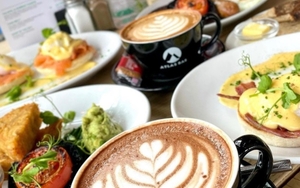There are pockets of astoundingly good food springing up around Manchester, you just need to know where to look
WE FOLLOWED our noses to a railway arch behind Piccadilly train station, to Pollen; a tiny independent sourdough bakery and Viennoiserie run by Hannah Calvert and Chris Kelly. They’ve only been open since September, but word has spread as easily as their hand churned, unpasteurised butter. Business is already going better than expected, with a steady weekly trade buoyed up by busy Saturday mornings and reams of wholesale customers. Despite the fact that they’re well off the beaten track, on the first day of trading their pastries sold out in 55 minutes and all the bread was gone by midday.
Local independent pubs and coffee shops such as Takk, Idle Hands, The Pilcrow, Ancoat’s Coffee and Cafe Beermoth have been quick to pick up on this special bakery and Pollen now supply them all with bread and pastries. They also caught the attention of Great British Menu Chef Adam Reid at his restaurant, The French at the Midland Hotel. As well as buying their white sourdough loaves, he has commissioned a special ale and malt loaf which he serves as a separate course in itself – testament to its quality.
The idea is to eventually get a more permanent retail unit with a bakery at the back and a small cafe at the front
Thanks to the slow, careful development process, this bread certainly deserves a little more attention.
“It’s all about long and slow fermentation,” says Hannah, “our white sourdough is called ‘28-hour sour’ as that’s the length of the process, which is the same method we adapt for all of our breads. We give it that time to allow all the water to fully hydrate the grain which allows it to lock all the nutrients and make it more digestible.”
All of the flour is organic and made from all British wheat, currently sourced from Matthew’s, a Cotswold miller and they also use 100% stone ground from Yorkshire millers which has more flavour and nutritional value due to the milling process – although it can be more unpredictable.
Hannah grabs half a loaf to show me the inside, “This is our Pollen rye bread. If you squidge it, it will bounce back over time, but on a commercially produced loaf that would never happen. You can see that it’s quite glossy, which means that the wheat is fully hydrated, so it’s already done its thing in the fridge rather than in your stomach.” It unfurls slowly like a sponge, or a fist relaxing.
She explains the process in more detail. “We use a mixture of white and rye flour in the leaven and it just improves the enzyme activity, making it bubble to give the final loaf a little more volume.” (Hannah, Chris and their other baker Morgan break off to have a geeky debate about how to pronounce ‘autolyse’ which is the scientific name for the process.) Then they add salt, and mix that for a while before mixing in any other additions like soaked cracked rye. The dough is then given a slow rest in a warm room (very much like going through a series of spa treatments) to prove for a couple of hours before being divided on their huge central table, shaped and left to prove in the fridge for another 18 hours.
Chris and Hannah were both bankers originally. “I’ve always had an interest in baking,” says Hannah, “I would never really buy bread. Then I started working in a bakery part-time, alongside my full-time banking job. I’d do a full week at work then I’d sleep for two hours, and do a full shift in the bakery on a Saturday. I carried on like that for about eight months and then gave it up and just worked at the bank. But that was never really what I wanted to do, it was just a means to an end to earn some money.” She eventually took the plunge and went to work for Haxby Bakehouse in York (included in The Sunday Times 30 best bakeries in the UK) before finally launching Pollen.
Hannah has a tattoo of a croissant on the inside of her wrist which underlines her devotion to baking – they’re already joking about her having the whole product list on there eventually.
“If it goes badly, Hannah takes it personally," confesses Morgan, “she really feels it if the bread’s not how she want it to be.”
Pollen offer a range of five breads: their signature loaf being the 28 hour sour, made with a blend of white flour, wholemeal flour and rye which are added for nutritional value and flavour; Pollen rye is made with 20% rye flour, so it’s more nutritious and it has added soaked cracked rye to give it a little bit of texture; Oat porridge has got a cooked oat porridge incorporated into the dough to make it really fluffy and moist; Five seed sour uses the same dough base as the white sour loaf, but has a blend of five toasted seeds incorporated into it and around the outside; Lastly, Danish style rye bread, which uses 100% rye flour. It contains only 3% gluten and has the same five seed blend added to it as well.
They also make pastries every day from Wednesday to Saturday; croissant, pain au chocolate, pain au raisin and a seasonal Danish with added fruit and nuts. On Saturdays, as they’re much busier, they add almond croissants, a few cakes, and the ‘cruffin’ (a cross between a croissant and a muffin) which usually sells out within a couple of hours. Occasionally, you’ll discover a special loaf such as dark chocolate orange which they made around Christmas. They’re also trying to perfect a fully wholemeal loaf at the moment which is notoriously difficult to get right.
Their bread is characterised by its darker crust. “It’s not burnt,” Hannah tells us, “it just adds more of a caramel flavour rather than being a soft, mushy nondescript crust.” She hands me some to taste. It demanded more chewing; but not back-teeth, hard-work chewing, more thoughtful ‘ahh, this is how bread is supposed to taste’ chewing, which just proves how removed we’ve come from how bread is supposed to taste. How it tasted before the war when industrialisation and the need for cheaper, faster bread became normality.
“Before we opened, we realised it was a risk”, says Chris, “I mean, would people come to a dodgy area of town, off the beaten track? It actually turned out not to be that much of a risk. We get the same faces every Saturday and new ones every day.”
Although they’re settled for now, there’s not much passing trade, so the idea is to eventually get a more permanent retail unit with a bakery at the back and a small cafe at the front, ideally somewhere on the outskirts of the city centre.
Pollen Bakery, 2 Sheffield St, Manchester, M1 2ND. Tel: 0161 273 3171. Opening Times: Wednesday 8am-4pm, Thursday 8am-2pm, Friday 8am-4pm, Saturday from 9am











